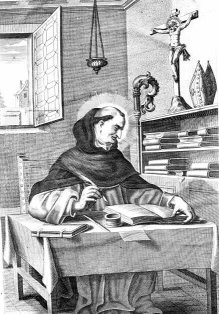“My soul, if you wish to be intimate with Mary, let yourself be carried between her arms and nourished with her blood . . . . Let this ineffable, chaste thought accompany you to the Banquet of God and you will find in the Blood of the Son the nourishment of the Mother.” ~ St. Albert the Great
SAINT ALBERT THE GREAT (1280 A.D.)
Bishop and Doctor of the Church
November 15
Albert the Great, Universal Doctor and Patron of the Sciences, was born in the castle of Lauingen on the Danube early in the 13th century. Under the inspiration of Bl. Jordan of Saxony (St. Dominic’s successor), the young count entered the Order of Preachers from the University of Padua, despite family opposition. Following ordination he taught in Dominican houses of study at Hildesheim, Freiburg in Breisgau, Ratisbon, and Cologne, achieving greatest distinction at the Priory of St. Jacques affiliated to the University of Paris. He was a pioneer in the experimental scientific method as well as in Aristotelian philosophy, and his solid achievements in science are acknowledged today. He was probably the most prolific writer on scientific and spiritual subjects in the medieval period. He was also bishop of Ratisbon, and preacher of the last Crusade in Germany. He died in Cologne in 1280, some time after an arduous walk to Paris and back to defend the memory of his greatest disciple, Thomas Aquinas.
“Do this in remembrance of me.” Two things should be noted here. The first is the command that we should use this sacrament, which is indicated when Jesus says, “Do this.” The second is that this sacrament commemorates the Lord’s going to death for our sake. This sacrament is profitable because it grants remission of sins; it is most useful because it bestows the fullness of grace on us in this life. “The Father of spirits instructs us in what is useful for our sanctification.” And his sanctification is in Christ’s sacrifice, that is, when he offers himself in this sacrament to the Father for our redemption to us for our use. Christ could not have commanded anything more beneficial, for this sacrament is the fruit of the tree of life. Anyone who receives this sacrament with the devotion of sincere faith will never taste death. “It is a tree of life for those who grasp it, and blessed is he who holds it fast. The man who feeds on me shall live on account of me.” Nor could he have commanded anything more lovable, for this sacrament produces love and union. It is characteristic of the greatest love to give itself as food. “Had not the men of my text exclaimed: Who will feed us with his flesh to satisfy our hunger? as if to say: I have loved them and they have loved me so much that I desire to be within them, and they wish to receive me so that they may become my members. There is no more intimate or more natural means for them to be united to me, and I to them. Nor could he have commanded anything which is more like eternal life. Eternal life flows from this sacrament because God with all sweetness pours himself out upon the blessed.
~ from a commentary by Saint Albert the Great on the Gospel of Luke
RESOURCES:
- Nov. 15 – St Albert the Great, Bishop, Confessor, and Doctor of the Church – Latin Mass Propers PDF
- On Union With God, Saint Albert The Great, Complete Audiobook (Youtube), The Roman Catholic Church
- Nov 15 – Homily: St. Albert the Great, Philosopher of Mary
- Litany of St. Albert the Great
~~~

